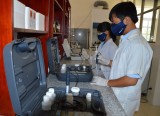Vietnam – overhauling supply chains to boost income
With the trend of regional and global integration on the rise, Vietnamese enterprises are on a mission to reinvent the nation’s supply-chains, giving domestic businesses a larger and more equitable piece of the pie.
Take coffee for example— the goal for many smallholder farmers is to grow, roast, package their beans and sell them directly online and make more money than they do now.

In the past they largely just grew the stuff and sold it to middlemen who ended up earning all the profits, leaving the farmer with a paltry share of the pie. So the aim of overhauling this model is to cut out the middlemen.
However, domestic enterprises are finding reinventing supply chains is no easy matter. It also isn’t a one size fits all model and each product must be analysed and treated independently.
Lawyer Tran Huu Huynh, chair of the Vietnam International Arbitration Centre recently said there usually is more than one supply chain model that might work for any given product.
Most of the current supply chains were developed in the context of a closed market economy Huynh said adding that they won’t work efficiently in an economy driven by open market forces leaving domestic businesses at a competitive disadvantage.
Consider a customer walking into Big C or Metro to purchase paper towels. The supply chain begins with the customer and their need for paper towels.
The next stage of this chain is Big C or Metro. They in turn stock the shelves with inventory from a distributor using trucks supplied by yet another business. Of course the paper towels were manufactured by yet another business.
All of these parties are part of the supply chain. In short the supply chain consists of all parties and functions involved, directly or indirectly, in fulfilling the customer’s request for paper towels.
Huynh said developing and organising all these parties in an efficient chain is quite complex and many businesses lack the staff with the capabilities to develop and implement an appropriate strategy.
VCCI Vice Chairman Hoang Van Dung underscored the need to improve capacity of Vietnamese business associations in the context of increasingly integration, saying that they should further enhance links so as to raise competitiveness, enabling them to join global value chains.
Dang Phuong Dung, secretary general of the Vietnam Textile and Apparel Association (VITAS) has expressed concern over the capacity of the staff of Vietnamese businesses to develop and give effect to appropriate supply chain strategies as well. Dung suggests business associations operate following two directions. On the one hand they need to get up to speed on the government’s policies and stance on the issues. On the other hand they need to work through business associations and develop their capabilities.
If domestic businesses want to increase their prestige, promote strength, and improve the competitiveness in the international arena, they need to connect with each other to get the advantages.
Economist Pham Chi Lan emphasised that the government’s development of more efficient supply chains is also being hampered by lack of funds. It takes a lot of money, time and qualified people to effectively carry out all the activities that need to be undertaken.
Sharing the same view with Lan, Nguyen Dinh Cung, Central Institute for Economic Management (CIEM) Director stressed the need to revamp the role of ministries. They are currently overwhelmed with the responsibility for issuing and enforcing policy, and regulating the market.
It should be left to businesses to develop their supply chains, Cung concluded.
VOV
 Management elevated to tackle tax revenue loss
Management elevated to tackle tax revenue loss
 Some new points of Decree 128/2024/ND-CP amending and supplementing trade promotion activities
Some new points of Decree 128/2024/ND-CP amending and supplementing trade promotion activities
 Solving challenges, promoting auxiliary industries
Solving challenges, promoting auxiliary industries
 OCOP – the process of brand and value affirmation
OCOP – the process of brand and value affirmation
 Binh Duong strengthens international cooperation, heightens industrial status
Binh Duong strengthens international cooperation, heightens industrial status
 Resolutely remove difficulties, ensure early completion of key projects
Resolutely remove difficulties, ensure early completion of key projects
 Replicate Vietnamese goods’ stores to implement the campaign "Vietnamese people give priority to using Vietnamese goods"
Replicate Vietnamese goods’ stores to implement the campaign "Vietnamese people give priority to using Vietnamese goods"
 Binh Duong supports Polytex Far Eastern Vietnam Co., Ltd. to quickly resolve any obstacles
Binh Duong supports Polytex Far Eastern Vietnam Co., Ltd. to quickly resolve any obstacles
 Proactively developing solutions to effectively tap U.S market
Proactively developing solutions to effectively tap U.S market
 Lego Vietnam completes 90% of construction and installation items
Lego Vietnam completes 90% of construction and installation items








